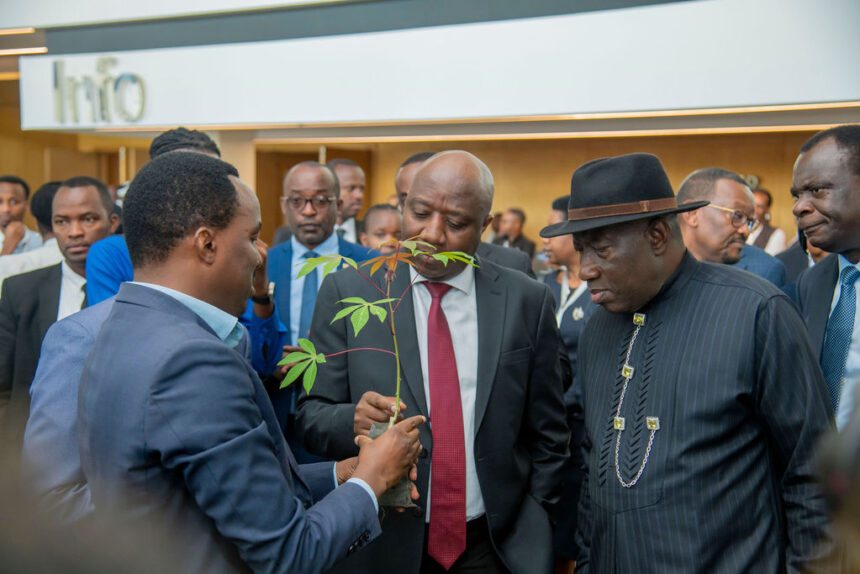By Onche Odeh
(Reporting from Kigali, Rwanda)
Africa has received insights on how the continent can unlock its vast agricultural potential through existing and emerging technological solutions.
This was the unanimous position of African leaders and prominent stakeholders who spoke at the second edition of the African Conference on Agricultural Technology (ACAT 2025), currently taking place in Kigali, the capital of Rwanda.
In a united voice, they declared: “The dream of a food-secure Africa is not only possible — it is within our reach. But it demands vision, unity, and unrelenting commitment.”
According to Dr. Édouard Ngirente, Prime Minister of the Republic of Rwanda, “Agriculture remains the backbone of Africa’s economies, employing over 60% of our population and contributing significantly to food security, livelihoods, and export earnings.”
However, he stated in his speech delivered at the official opening of ACAT 2025 that the vast potential of Africa’s land has not translated into commensurate levels of productivity. This, he said, is because farmers on the continent face persistent barriers, ranging from unpredictable climate patterns and outdated farming methods to limited access to markets and insufficient financing.
Dr. Goodluck Jonathan, who was President of the Federal Republic of Nigeria from 2010 to 2015 and now an AATF Ambassador, emphasized that Africa stands at a historic crossroads in its journey to becoming a global powerhouse in food and nutritional security.
He cited precision farming, satellite imaging, drone technology, artificial intelligence, and digital platforms as some of the tools that can revolutionize what African farmers are able to do with every seed or grain — including how they plant, irrigate, harvest, store, market, and sell crops.
“Africa stands at a historic crossroads. On one road lies the continued struggle with food insecurity, anchored on underutilized land, limited use of innovative technology, and fragmented markets. On the other lies a bold vision — one that sees Africa as a global powerhouse in food and nutritional security, powered by innovation, partnerships, and transformative investment,” he said.
Aligning his views with those of the Rwandan Prime Minister, Dr. Jonathan said climate change remains a major threat that could undermine decades of progress and new agricultural initiatives across the continent.
To leapfrog this threat, Dr. Jonathan emphasized the need for Africa to scale up climate-smart agricultural practices that build resilience, restore ecosystems, and ensure that food production does not come at the expense of the environment. In this regard, he stressed that water management, soil health, biodiversity, and renewable energy must be central components of Africa’s agricultural development strategies.
He added that the future of agriculture in Africa is intricately tied to the continent’s ability to embrace and scale both existing and emerging technologies.
Dr. Jonathan commended the promising innovations already taking place across the continent, citing tech-driven platforms from Nigeria, Kenya, Ghana, and Rwanda that connect farmers to markets, provide weather forecasts, and facilitate access to credit.
However, he noted, “For these innovations to scale, Africa must deliberately invest in rural infrastructure, digital literacy, and affordable connectivity.”
Similarly, Dr. Ngirente stated that the future of Africa’s agriculture — and its ability to feed the continent’s rapidly growing population — depends on how effectively technology and innovation are harnessed.
“From precision farming and digital extension services to climate-resilient seeds and AI-driven data tools, NextGen Ag-Tech is no longer a luxury — it is a necessity,” the Rwandan Prime Minister said.
However, he cautioned that technology alone is not enough.
“We need supportive ecosystems: good and enabling policies, investments in infrastructure, access to finance, and, most importantly, the voices and agency of farmers themselves must shape the solutions we develop and promote,” he said.
He shared the Rwandan model, which he said places innovation and technology at the heart of its national development strategy, including within the agricultural sector.
“We have witnessed firsthand how digital tools can empower farmers — from mobile-based advisory services to satellite-supported crop monitoring and blockchain-powered traceability systems,” Dr. Ngirente stated.
Dr. Mark Cyubahiro Bagabe, Minister of Agriculture and Animal Resources, Republic of Rwanda, emphasized that prioritizing farmers’ needs and preferences is a paradigm shift that must be embraced.
He said this means placing smallholder farmers at the center of all decisions, investments, and innovations. It involves listening to their challenges, valuing their traditional knowledge and wisdom, and co-creating solutions that empower them to enhance productivity.
“Our policies and programs in Rwanda are based on the understanding that providing farmers with the necessary resources, information, and support networks is essential for sustainable development,” he said.





